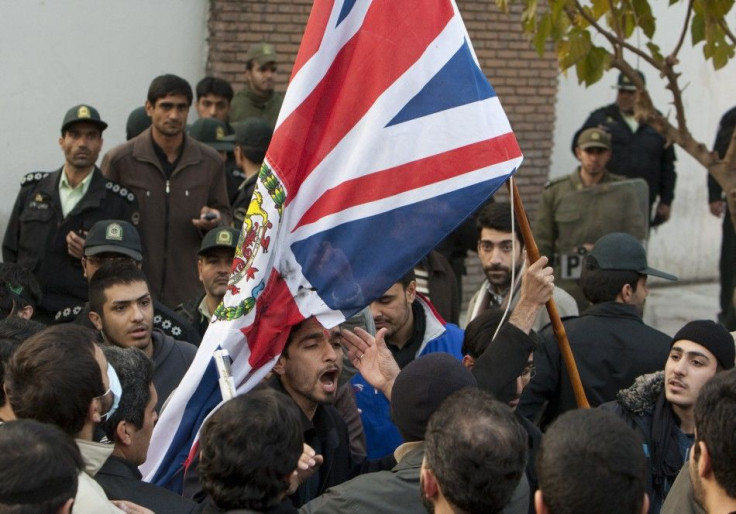Iranian Students Storm British Embassy in Tehran

In a scene of anger that looked like a replay of the 1979 Islamic Revolution, dozens of hard-line Iranian students stormed the British Embassy in Tehran on Tuesday, tearing down the Union Jack flag and flinging documents out of windows.
Clashing with anti-riot police, and chanting, The Embassy of Britain should be taken over and Death to England, the protestors demanded the British ambassador be sent home immediately. On Sunday, the Iranian Parliament voted to expel the ambassador and reduce diplomatic relations with the United Kingdom following London's support of recently upgraded Western sanctions on Tehran, The Associated Press reported.
There was no immediate word on casualties or how many embassy employees were inside at the time of the assault, although it occurred after business hours had ended. Less than two hours later, police appeared to have regained control of the site.
The British Foreign and Commonwealth Office denounced the riot, saying Iran has a clear duty under international law to protect diplomats and offices. Officials were still checking on the well-being of workers and diplomats, a spokeswoman said on condition of anonymity.
We are outraged by this, said the statement. It is utterly unacceptable and we condemn it.
The occupiers called for the closure of the embassy, calling it a spy den -- the same phrase used after militants stormed the U.S. embassy in Tehran in 1979 and held 52 hostages for 444 days. Washington and Tehran have not had diplomatic relations since then, the AP reported.
Tensions with Britain date back to the 19th century when the Persian monarchy gave huge industrial concessions to London, which later included significant control over Iran's oil industry. And in 2007, Britain's decision to honor author Salman Rushdie with a knighthood angered Iran, whose leader, Ayatollah Khomeini, issued a 1989 fatwa, or religious edict, ordering Muslims to kill the author because of his novel The Satanic Verse allegedly insulted Islam.
The British Foreign Office also called the Iranian Parliament's Sunday vote to expel the British ambassador regrettable.
This unwarranted move will do nothing to help the regime address their growing isolation or international concerns about their nuclear program and human rights record, the office said in a statement.
If the Iranian government acts on this, we will respond robustly in consultation with our international partners.
Last week, Britain severed all financial ties with Iran over its disputed nuclear program -- the first time it has ever cut an entire country's banking sector off from British finance, the UK Treasury said. All British credit and financial institutions were ordered to end their business relationships and transactions with all Iranian banks, their branches and subsidiaries by Monday, CNN reported.
The decision follows an International Atomic Energy Agency (IAEA) report that pinpointed the possible military dimensions of Iran's nuclear program, the Treasury statement said Monday.
The IAEA's report last week provided further credible and detailed evidence about the possible military dimensions of Iran's nuclear program, British Foreign Secretary William Hague said Monday.
Today we have responded resolutely by introducing a set of new sanctions that prohibit all business with Iranian banks.
Iran maintains that its nuclear program is strictly for peaceful purposes and has called the UN watchdog's report unbalanced and politically motivated.
© Copyright IBTimes 2025. All rights reserved.





















